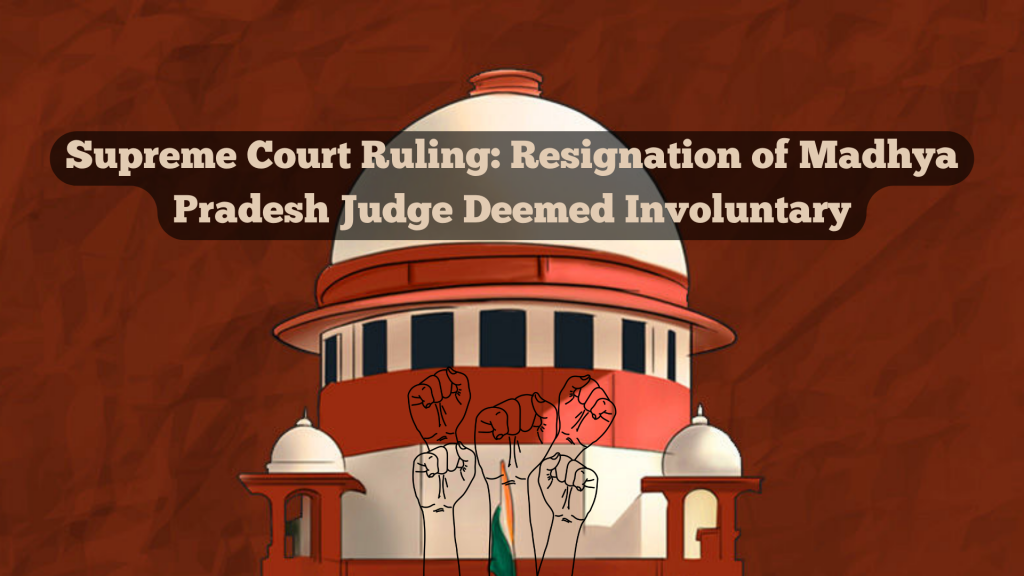
Supreme Court Ruling: Resignation of Madhya Pradesh Judge Deemed Involuntary
Judgement Given On : 09/12/2021
In a landmark judgment on December 9th, 2021, the Supreme Court, in the case of Ms. X vs. Registrar General, High Court of Madhya Pradesh and another, established that the petitioner’s resignation from the position of Additional District & Sessions Judge in Gwalior was not a voluntary act, but rather a consequence of dire circumstances.
The petitioner had been selected for the Madhya Pradesh Higher Judicial Services at the District Entry Level in 2011 and was appointed as 2nd to 1st Additional District and Sessions Judge in Gwalior on August 1st, 2011. She received positive performance evaluations in 2013 and 2014, reflecting her competence in the role. However, the petitioner alleged sexual harassment by a colleague, Justice ‘A,’ and was subsequently transferred from Gwalior to Sidhi in July 2014. Facing the challenge of her daughter’s education, she made two representations to the Registrar General of the Madhya Pradesh High Court, requesting an extension in Gwalior or an alternative posting to accommodate her daughter’s schooling needs. Both requests were denied. Unable to secure a favorable outcome for her daughter’s education, the petitioner resigned on July 15th, 2014, and her resignation was accepted on July 17th, 2014. The petitioner later sought reconsideration of her resignation from the President of India and the Chief Justice of India.
The central issues before the court were as follows:
- Validity of the transfer order from Gwalior to Sidhi.
- Legality of the rejection of the petitioner’s representations.
- Whether the petitioner’s resignation can be deemed voluntary given the circumstances.
The court after reviewing the matter found that:
- Validity of the Transfer Order: The court determined that the transfer of the petitioner was not made in the public interest or for administrative reasons, but rather based on unverified allegations. It characterized the transfer as “malice in law” due to its failure to adhere to transfer policy guidelines.
- Legality of Representation Rejection: The court concluded that the rejection of the petitioner’s representations was irrational and not in compliance with the transfer policy. It emphasized the petitioner’s legitimate expectation of consideration for an alternate posting.
- Involuntary Resignation: The court examined the circumstances surrounding the petitioner’s resignation, highlighting her daughter’s education and her own professional commitments. It noted that the petitioner resigned out of exasperation and frustration. The court emphasized that a resignation should be voluntary, and in this case, it was not.
Judgment:
In its ruling, the court declared that the petitioner’s resignation from the position of Additional District & Sessions Judge in Gwalior on July 15th, 2014, was not voluntary. The resignation was quashed, and the petitioner was reinstated with effect from that date.
The judgment underscores the importance of ensuring that resignations by judicial officers are genuinely voluntary and not coerced by external factors. It upholds the principles of fairness, rationality, and adherence to established policies within the judiciary. This decision serves as a reminder of the duty to protect the rights and interests of judicial officers while preserving the integrity of the judicial system.
